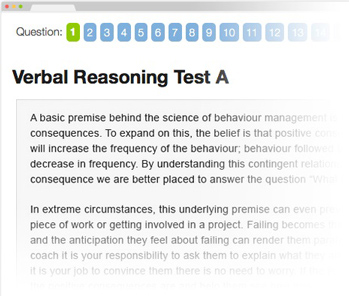
We are delighted to welcome a guest post from Ed Mellett, Director at WikiJob
If you’ve spent the last few years studying and you have now finished your degree, it’s time to enter the world of work either through a graduate program or regular job with a leading firm. The majority of large employers now use what’s known as an aptitude test to evaluate a number of skills in several different areas. The aptitude test is commonly found in various graduate level vacancies because employers use them to determine how well you will perform in the role you have applied for, rather than relying on your qualifications as an indicator of performance. But what exactly are these aptitude tests, how do you prepare for them and most importantly, how can they help you secure employment?
Aptitude tests are frequently used in the recruitment process as a method of shortlisting candidates or to ensure that the applicants recruiters have shortlisted are suitable for their organisation. As with anything, if you know what to expect beforehand and you have read a little on aptitude tests, you will be more prepared if you are asked to sit them when applying for graduate jobs.
Aptitude tests or psychometric tests as they are sometimes refereed are impersonal, objective and standardised. There are several different types of the tests which are used to assess various skills and competencies. Employers place a great deal of emphasis on these assessments as part of the selection process because they are thought to be an accurate method of evaluating the strengths of the applicant in a workplace situation regardless of your educational background.
Different types of aptitude test
The aptitude test is often used at various points throughout the recruitment and selection process including immediately after submitting your application, at the first interview, at the final interview or at an assessment centre. Sometimes you may be asked to sit the same aptitude test twice with the second test used to confirm the result of an earlier test or you may have to sit several tests at different stages in the recruitment process. It very much depends on the employer so it is always worth finding out if you are applying to a specific firm.
The main types of aptitude test include;
- Numerical Reasoning – Your ability to read, analyse and interpret data, carry out basic calculations or identify patterns in data
- Verbal Reasoning – How well you read and understand written information and evaluate arguments
- Non-Verbal Reasoning – The way in which you use diagrams and images to identify patterns
- Logical Reasoning – If you can follow information through to a conclusion using existing experience or knowledge
Each of the aptitude tests will include a set of approximately 30, multiple choice questions which you have to progress through under timed conditions. Typically, you will have 30 seconds to a minute to answer each question so it is important that you learn how to approach the tests and progress through the questions quickly and accurately.
There are currently two types of logical reasoning test including inductive reasoning and deductive reasoning so it is recommended that you familiarise yourself with each.
Inductive Reasoning

Typically found in particular industries such as IT, engineering or science inductive reasoning tests are part of the recruitment process in technical roles. Each question will present a series of pictures but there will be minor differences between each image. You may be asked to look at a set of pictures and select the one that would complete the series.
Deductive Reasoning

Another method of logical reasoning, deductive assessments are designed to evaluate a different kind of problem solving. In this test you will be expected to evaluate a number of rules and then apply these rules to make predictions on the likely outcome of a given scenario. These assessments are used in roles where you are required to create new solutions or think up creative ideas such as design or development.
An aptitude test is specifically designed to evaluate your ability to learn a new skill required for the job that you are applying for and the type of test will be determined by the sector and role you are applying for.
The importance of practice

Aptitude tests are not something that you can succeed in without completing any preparatory work beforehand. As they are very fast paced it is important that you perfect your technique and accustom yourself to the nature of the assessments. The best way to approach an aptitude test for a graduate vacancy or training scheme is to familiarise yourself with the questions and format of the tests. You will also be able to identify weaker areas or certain skills that you need to work on. If you have a numerical or verbal reasoning test to complete as part of the recruitment process there are several things that you can do to prepare. Firstly, you should polish up on your mathematical skills. Numerical reasoning tests don’t require advanced numeracy such as trigonometry or algebra; they simply demand a good grasp of the basics. Focus specifically on percentages, ratios and basic calculations. If you are sitting a verbal reasoning test brush up on your spelling and when you read a newspaper or magazine think about the statements, their meaning and how they could be interpreted.
With the internet it is now possible to access aptitude tests online through careers websites and dedicated test practice sites. It is well worth taking the time to sit as many of these tests as you possibly can so you are as fully prepared as possible and you can sit the test on the day of your interview with confidence. Practice is really important, not just so you can familiarise yourself with the style and structure of the test but to make sure you get your timing right and you avoid making common mistakes such as misunderstanding the question or marking your answer against the wrong question when working under pressure.
Aptitude tests are certainly not impossible provided that you research them and carry out the necessary preparation. Your college or university will have lots of information and advice on these tests and the Internet is a great resource too. If you prepare properly there is no reason why you can’t succeed and secure your ideal graduate employment opportunity.
